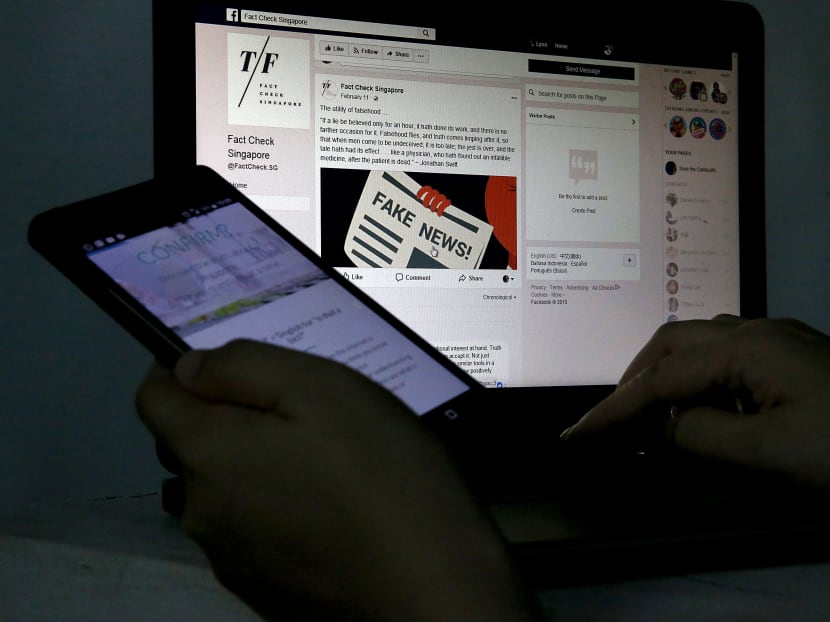Countering fake news is more than just about having new laws, experts say
SINGAPORE — Given the varied consequences of online falsehoods and the difficulty in tracking perpetrators who are continuously finding ways to hide their tracks, experts said that countering fake news and those who spread them has to go beyond just introducing new laws.
SINGAPORE — Given the varied consequences of online falsehoods and the difficulty in tracking perpetrators who are continuously finding ways to hide their tracks, experts said that countering fake news and those who spread them has to go beyond just introducing new laws.
There are limitations in laws, especially when seeking to prosecute perpetrators located outside of Singapore.
Other proposed countermeasures such as enhancing public education as well as reinforcing social cohesion and trust are "nuanced approaches" that can guide the public to be discerning and reject fake news, they added.
The experts in the legal, communications and national security fields spoke to TODAY after the Select Committee on Deliberate Online Falsehoods released its report on Thursday (Sept 20). They were among those who made submissions at the public hearings held by the committee earlier this year.
In its report, the committee put forth 22 recommendations to deal with the serious threat of fake news. These included measures such as new laws and criminal sanctions to go after and cripple the revenue sources of "hired guns" who are paid to spread misinformation, and to hold technology companies accountable.
The committee also proposed having better public education, reinforcing social cohesion and trust as well promoting fact-checking as other equally important measures.
National security expert Shashi Jayakumar said that there is a challenge in identifying perpetrators who peddle online falsehoods. State actors, for instance, are constantly improving their methods and can use sophisticated means to hide their tracks, he added.
"They then have plausible deniability," said Dr Jayakumar, who heads the Centre of Excellence for National Security at the S Rajaratnam School of International Studies.
"This is why the public should not get fixated on the legislative tack. In my view, this is only part of the toolkit, which was what the report said. The measures to shore up digital resilience, and other off-line approaches highlighted by the committee are equally, if not more important."
Associate Professor Goh Yi Han, dean of law at Singapore Management University (SMU), noted that the committee had considered that falsehoods can occur in many different situations, "each of which may lead to varying degrees of impact".
This shows that the committee is aware that "a nuanced approach, comprising public education and carefully calibrated legislation, needs to be taken against deliberate online falsehoods", he added.
Legal academic Eugene Tan of SMU pointed out that laws seeking to prosecute individuals based outside Singapore have their limitations. The key challenge is bringing those individuals here.
"In terms of investigation, the evidence may also be abroad and so, the co-operation of the authorities here is necessary," he added.
As for social media giants, he said that they probably operate and are registered here, so they should come within Singapore's jurisdiction. "In any case, they are not going to run away and hide."
SAFEGUARDS AGAINST ABUSE OF POWER
Associate Prof Tan also said that for the new laws introduced, there should be safeguards to deter abuse of power. "The need for judicial oversight before a significant power is exercised is crucial and must constitute a key plank of any proposed law.
"Unfettered power poses as grave a threat as deliberate disinformation."
Dr Jayakumar said that when it comes to using legislation to counter online falsehoods, there is a need for "calibration", as in the laws should address certain situations where a threshold of serious harm has been done.
Addressing concerns that legislation to curb fake news might curtail freedom of speech, the committee said that online falsehoods "harm democracy and the genuine contestation of ideas in the 'marketplace'".
"Measures to combat online falsehoods do not necessarily lie in opposition to freedom of speech. In fact, both serve the same ideals," the committee stated.
Professor Lim Sun Sun, who heads Singapore University of Technology and Design's humanities, arts and social sciences cluster, said that freedom of speech can only thrive in a healthy media environment where people have access to credible information. "Online falsehoods undermine the quality of information and can adversely affect public discussion of important issues," she added.
EFFORTS TO 'CURB THE SCOURGE' CONTINUE
When approached to comment about the committee's report, tech giants Facebook, Google and Twitter — whose representatives had appeared before a public hearing earlier this year — said that they remain committed to counter online falsehoods.
A spokesperson from Facebook said that the firm has made efforts to curb the scourge by removing fake accounts and disrupting the financial incentives behind false news, among others.
"This effort will never be finished and we are committed to working together with the Government, industry, news publishers, and our community on this."
Similarly, Google said it has improved its search algorithms such that "credible information and authoritative news sources are weighted more heavily".
It also supports quality journalism and "fact-checking networks" through the Google News Initiative launched in March.
Twitter said that the firm "cares deeply" on issues relating to online falsehoods, and its potentially harmful effects on civic and political discourse. "We look forward to the Singapore Government's continued engagement with the industry on the full range of approaches to address these issues," its spokesperson said.
The 10-member committee examining the issue of online falsehoods and the actions to take was convened in January this year, and public hearings were held from March to consider various views submitted. The committee chaired by Deputy Speaker of Parliament Charles Chong is made up of eight People's Action Party Members of Parliament (MPs), opposition MP Pritam Singh and Nominated MP Chia Yong Yong.







